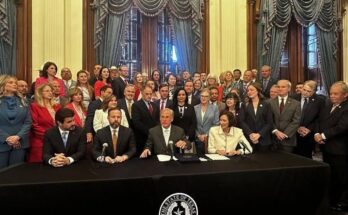HISTORIC REVOLUTION: Right Now — Jimmy Kimmel and Stephen Colbert Launch Uncensored Truth News Channel, Has Surpassed an Unbelievable 1 BILLION Views Worldwide. Fans Are Calling It “Groundbreaking” and Industry Insiders Say “It’s Gonna Break Records”… – hghghg
In a world where truth often feels like a casualty of politics, ratings, and corporate agendas, two of late-night television’s most unlikely heroes have just detonated a bomb under the foundations of mainstream media. Jimmy Kimmel and Stephen Colbert, once seen as network loyalists and comedic gatekeepers, have joined forces to launch Truthline Media — an uncensored, independently funded news platform that has already shattered expectations, crossing 1 billion views worldwide within weeks of its debut.
It’s not just a new show. It’s a cultural rebellion — a declaration that truth, humor, and humanity can still coexist in a landscape dominated by algorithms and outrage.
A Revolution Born from Disillusionment
For decades, Kimmel and Colbert have lived inside the machine. They’ve watched how networks massage narratives to please advertisers, how corporate boards quietly steer conversations, and how the public — increasingly cynical and fractured — has tuned out of what used to be called “news.”

Colbert put it bluntly in the premiere episode:
“We spent years telling jokes about the circus without realizing we were the clowns holding up the tent.”
It was a startling admission — not of guilt, but of awakening. Colbert and Kimmel’s careers were built on the backs of monologues that poked fun at politicians, pundits, and the culture wars that defined America. But behind the laughter, both men privately wrestled with the same question: What happens when comedy stops being a mirror and becomes a mask?
Truthline Media is their answer — and it’s shaking the world awake.
Unfiltered, Unscripted, Unapologetic
The format is radical. No studio audience. No teleprompter. No pre-approved jokes. Each broadcast is a high-wire act of truth-telling, humor, and occasionally raw vulnerability. Kimmel and Colbert sit in a minimalist studio surrounded by screens displaying live comments from viewers around the world. Every statement they make can be challenged, fact-checked, or expanded on in real time.
Colbert describes it as “a conversation with humanity — not a sermon.”
The topics are as fearless as the tone: corporate censorship, mental health in Hollywood, the hidden influence of intelligence agencies in entertainment, and the silent epidemic of loneliness in the digital age. They even tackled the ethics of their own profession — dissecting how late-night comedy became, in Kimmel’s words, “the anesthesia of a wounded nation.”
What makes Truthline Media revolutionary isn’t just what they talk about, but how they talk about it. Viewers don’t just watch — they participate. It’s journalism turned inside out, stripped of ego and pretense.
The Shockwave of 1 Billion Views
When the channel surpassed one billion views, it wasn’t merely a viral success — it was an indictment of everything traditional media stands for. Analysts expected a modest following, perhaps a cult audience of loyalists nostalgic for Kimmel and Colbert’s late-night days. Instead, they ignited a global wildfire.
Sixty percent of their viewership now comes from outside the United States — proof that disillusionment with mainstream media isn’t an American problem, but a human one.
“People are done with plastic news,” said British journalist Owen Griggs. “They want imperfection, transparency, and contradiction — all the things that make truth feel real.”
The most viewed episode to date, “The Lie Machine: How Networks Script Reality,” exposed the subtle ways corporate networks shape public discourse. It was funny, devastating, and strangely hopeful — hitting 150 million views in three days, outpacing Super Bowl halftime clips and major movie trailers.
The Industry Panic: What Happens When Comedians Do the Journalists’ Job Better?
Truthline’s rise has sent a chill through the corridors of traditional networks. Executives at ABC, CBS, and NBC reportedly held emergency meetings after the billion-view milestone. The fear isn’t just about losing viewers — it’s about losing narrative control.
Kimmel’s former colleagues describe him as a “traitor” who turned against the machine that made him. Yet Kimmel dismisses those claims with characteristic sharpness:
“If telling the truth makes me a traitor, then maybe we should ask who we were loyal to in the first place.”
That single quote has been shared more than ten million times — a rallying cry for a generation fed up with half-truths dressed as journalism.
Industry veterans are torn. Some hail Kimmel and Colbert as the new Woodward and Bernstein — truth-tellers using humor as armor. Others accuse them of reckless populism, claiming they’re “weaponizing comedy” against the establishment.
:max_bytes(150000):strip_icc()/Stephen-Colbert-and-Jimmy-Kimmel-093025-1-8b80e89ce5b5479989a4a2f31a465fdb.jpg)
But the data doesn’t lie: the world is listening.
A Mirror to the Media — and the Audience
Truthline’s greatest power lies in its self-awareness. Kimmel and Colbert aren’t pretending to be saints. They freely admit they were once part of the problem. In one emotional segment, Colbert confessed:
“We laughed at the collapse of civility. We joked about corruption as if laughter alone could fix it. But satire without responsibility becomes complicity.”
It’s that kind of brutal honesty that resonates deeply with viewers. Unlike corporate anchors reading sanitized teleprompter lines, Kimmel and Colbert sound like men trying to make sense of the chaos alongside their audience — not above them.
And therein lies the revolution: they’ve humanized journalism.
By allowing themselves to be wrong, emotional, and self-critical, they’ve made truth accessible again.
The Fearless Transparency Model
Truthline Media’s production model is equally audacious. Every segment includes a real-time correction ticker — a scrolling feed where verified editors can flag inaccuracies as they appear. If a mistake is made, it’s corrected on the spot, sometimes mid-sentence.
“Say it. Prove it. Or correct it.” That’s the channel’s motto — and its lifeblood.
Compare that to the opaque world of network journalism, where corrections appear days later in small print. Truthline’s radical transparency has turned skepticism into participation. Viewers don’t just consume truth — they build it.
The Cultural Ripple Effect
The impact has extended far beyond the screen. Truthline has inspired independent journalists, podcasters, and even YouTubers to adopt similar transparency models. Across the internet, creators are citing Kimmel and Colbert as proof that integrity and profitability don’t have to be enemies.
Hollywood, meanwhile, is torn. Jon Stewart, Dave Chappelle, and Bill Maher have voiced admiration. Stewart called the project “the first genuine attempt to make truth go viral.”
Others, particularly network executives, see it as dangerous. An anonymous CBS producer told Variety:
“They’re breaking every rule — and it’s working. If this keeps up, nobody will trust us anymore.”
From Satire to Salvation
There’s an irony that can’t be ignored: two men once known for their punchlines are now leading what some call a truth movement. In turning away from corporate comedy, they may have stumbled onto something far more profound — the reawakening of civic curiosity.
In a digital world where outrage sells and nuance dies, Kimmel and Colbert are proving that audiences still crave depth. Their success isn’t just about rebellion; it’s about redemption — for themselves, for comedy, and perhaps for journalism itself.
“We’re not here to preach,” Kimmel said in a recent livestream. “We’re here to remind people that laughter doesn’t have to mean blindness.”
It’s a small sentence, but it captures the essence of their mission: to use humor not as a distraction, but as illumination.

A Billion Views — and a Beginning
As Truthline Media’s numbers soar past a billion, it’s clear this isn’t a passing fad. The project is expanding into documentaries, live town halls, and collaborations with independent whistleblowers. A book titled Truthline: The Revolution Will Be Televised is rumored for early 2026.
Yet even with global acclaim, both men insist the mission has only begun.
“We’re not chasing views,” Colbert said. “We’re chasing honesty. And if a billion people showed up for that, maybe the world isn’t as lost as it seems.”
For years, late-night comedy made Americans laugh about the absurdity of power. Now, it’s making them think about it. And perhaps, for the first time in a long time, laugh with the truth — not at it.
Because when comedians start doing the journalists’ job better than journalists, it’s no longer entertainment.
It’s evolution.
It’s history.
It’s the revolution the world didn’t know it was waiting for.




